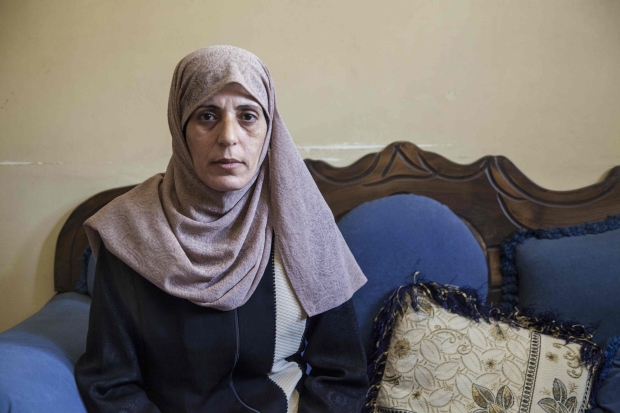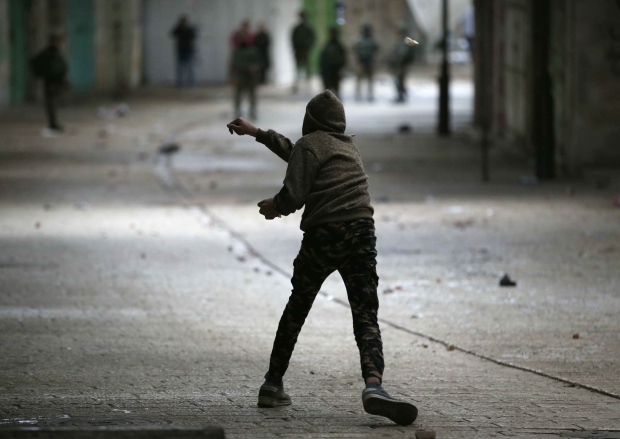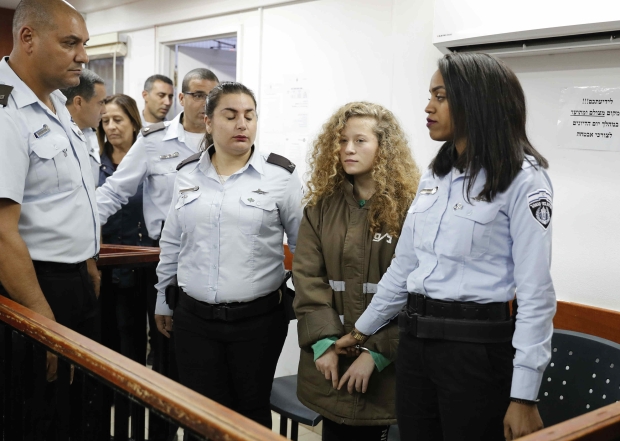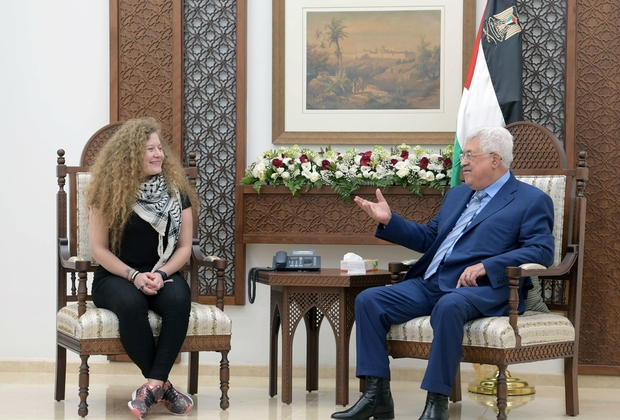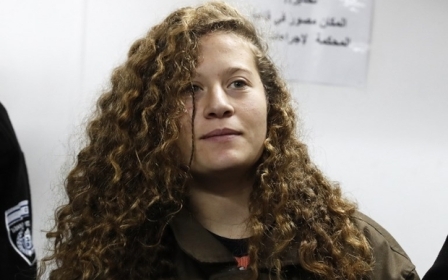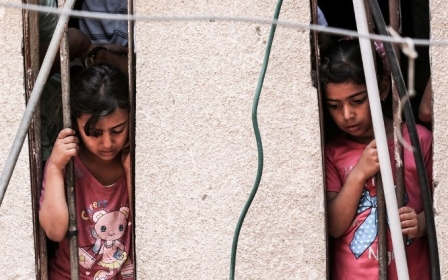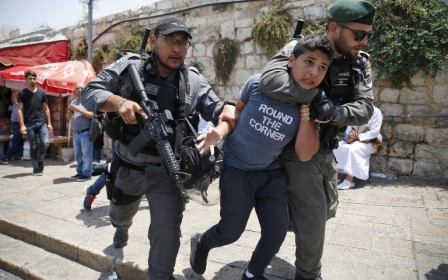Azzoun: The Palestinian village filling Israeli jails with children
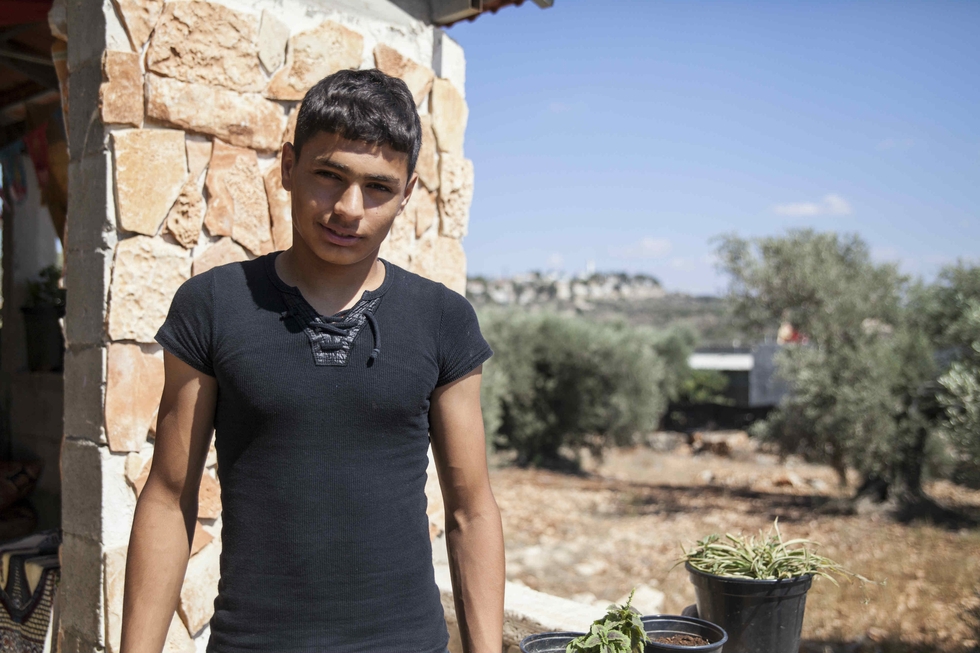
AZZOUN, Palestine - A month before his arrest, 30 Israeli soldiers came to Yasin Shbeita’s house in the middle of the night, saying they had their captain’s authorisation to kill him.
“I don’t want to put you in prison for months or years, I want to kill you and get rid of you right now,” one soldier said, according to Shbeita.
Just 16 at the time, the soldier’s threat left Shbeita in fear for his life.
“I was afraid they would come and kill me at any time,” Shbeita told Middle East Eye.
On 11 April, the Israeli soldiers came back. Raiding his house at night, they violently arrested him.
The soldiers dragged Shbeita out of his home in Azzoun – a village in the northern occupied West Bank – and tossed him to Israeli border control police.
The teen said the police then began hitting him and pushed him towards a military jeep at the end of his driveway.
“Each soldier passing by me was kicking and slapping me,” Shbeita said, while pointing to where he was beaten up.
Common experience
Shbeita’s dramatic experience is a common one, especially in Azzoun, which has the highest number of child arrests in the West Bank per capita, according to its municipality’s communications officer, Hassan Shabtta.
Azzoun is surrounded by five illegal Israeli settlements and also lies adjacent to the separation wall.
“The Israeli army enters Azzoun 398 times a year - by day or night - and puts checkpoints inside the town. This creates pressure inside the people. They’re exploding,” Shabtta told MEE.
'I was afraid they would come and kill me at any time'
- Yasin Shbeita, ex-child prisoner
In the face of such an overwhelming military presence, Shabtta said many young boys in the village often go to the main road and throw stones.
“The Israelis pressure the young to go out to resist the occupation, [but] the Israelis want to kill the spirit of resistance so they arrest them,” he said.
In a statement to Middle East Eye on Wednesday, an Israeli army spokesperson maintained that Azzoun "is treated no differently to other places in the area".
"Unfortunately, in recent years many minors, including very young ones, have been involved in violent events, including terror offences and other crimes," the army added.
Ahmad Rayan, 15, also lives in Azzoun and has already been imprisoned twice.
His mother, Salam Rayan, told MEE a story almost identical to Shbeita's of how her son was most recently arrested on 30 July.
She said around 12 Israeli soldiers came to their house around 2am, and after bursting through the front door, took Ahmad Rayan from his bed.
“They tied his hands outside the house and stopped him from wearing different clothes and shoes,” Salam Rayan said.
Israel’s detention of minors has been highlighted recently by the case of Ahed Tamimi, a Palestinian teen jailed for eight months for slapping an Israeli soldier.
Yet Tamimi’s case is unique in its media attention.
No reports came out in the media the day after Shbeita was taken from his home, even though he was the same age as Tamimi when she was arrested.
Shbeita told MEE he and other young prisoners are “angry about the media”.
“Why Ahed Tamimi and no one else? There are a million other Ahed Tamimis in prison, she’s like any other prisoner.”
Nabi Saleh, where Tamimi comes from, is a West Bank village well known for its resistance against the Israeli occupation, thanks to residents’ proactive approach to using social media.
In contrast, little is known by the world about the repeated Israeli raids on Azzoun.
Widespread, systematic and institutionalized
"Where cases involve minors, their age is taken into account in the process of law enforcement," the Israeli army told MEE.
But according to a report released by UNICEF in 2013, “ill-treatment of children who come in contact with the [Israeli] military detention system [is] widespread, systematic and institutionalized”.
This ill treatment runs from the moment of arrest through to the child’s prosecution, conviction and sentencing.
The majority of children are charged with throwing stones.
Once children are in Israeli military custody they are transferred in the back of a military jeep between different bases and police stations in settlements for interrogation.
Children like Shbeita complain of mistreatment.
“I was taken to a military camp blindfolded. I couldn’t sleep, didn’t eat - not even water,” Shbeita said.
“I tried to sleep and put my head down at one point. A soldier came and hit a metal bar on the desk to wake me up, took off my blindfold and started interrogating me. That first session lasted from 3 to 8am.”
“They were showing videos and pictures of random people. They were telling me it was me and kept saying, ‘Either you confess to it or we’ll put you in prison - in the dark - or we’ll kill you’,” Shbeita recalled.
According to the 2013 UNICEF, “no child has been accompanied by a lawyer or family member during the interrogation.” Those MEE spoke to had the same experience.
Lacking any friendly supervision or support, the children can be exposed to enormous pressure and subject to paranoia under interrogation.
“They ask them questions for a very long time and the child is like, ‘I’m done with this,’ he gives up and tells them ‘I threw one stone’. They think it will be over if they say something,” Salam Rayan explained, based on her child’s first experience of detention.
If the child ends up confessing they are forced to sign a form written in Hebrew, a language they do not understand.
Brutal imprisonment
Once Shbeita was transferred to a prison cell, he was “hit brutally” on his arms and legs.
“The other prisoners told the guards I needed to be taken into medical care but instead I was taken to a solitary confinement cell,” Shbeita said.
“It’s so dark, you don’t know if it’s day or night. There’s sewage on the floor, one toilet and a small bed.”
'It’s so dark, you don’t know if it’s day or night. There’s sewage on the floor, one toilet and a small bed'
- Yasin Shbeita, ex-child prisoner
The United Nations Committee against Torture strictly forbids children being placed in solitary confinement due to the detrimental impact on psychological well-being.
International law requires children to be brought before a judge within 24 hours of their arrest.
It took Shbeita three days to have his first hearing, which was also the first moment he was able to see a lawyer, though he was not able to speak to them.
The 16-year-old had seven hearings in total, over the course of a month and a half. His mother was unable to attend all but one, due to restrictions placed on her from travelling into Israel.
Only in the last hearing was he told what the charge against him actually was - throwing stones.
“They gave me two months in prison and a 3,000 shekel ($807) fine for endangering the lives of settlers.”
“Some of these types are physical violence, others constitute psychological pressure like putting children in solitary confinement,” he told MEE.
“All these types of ill treatment, as well as humiliation and intimidation, is to extract information from them by force, and these confessions constitute the primary evidence before the Israeli military legal system.”
Changes in personality
Salam Rayan said her son changed after being released from prison when he was arrested for the first time last year.
Ahmad himself said he internalises his fear and since his imprisonment has become more grown up.
“When they spend a year inside military prisons [at that age], it’s almost equivalent to five years, so when they leave they feel more mature, like adults, men. He’s … not a kid anymore,” Salam Rayan said.
Reema Shbeita, Yasin Shbeita’s mother, told MEE her son has become nervous since leaving the Israeli military prison.
'We believe all children are affected because the whole system is designed to break the psychological wellbeing of everybody who passed through the system'
- Ayed Abu Eqtaish, Defense for Children International
“He’s always afraid someone will come and take him again. They [children of this age] live in horror,” she said while sitting next to her son on their balcony.
With hundreds of children arrested every year, a whole generation of Palestinian children is emerging that have been subjected to psychological abuse.
“We believe that every child who passed through this experience will be psychologically affected, and the level of the psychological impact depends on the age of the child when arrested, the types of ill treatment and torture he experienced inside the Israeli prison,” Abu Eqtaish said.
“We believe all children are affected because the whole system is designed to break the psychological wellbeing of everybody who passed through the system, whether they be children or adults, but the impact on children is more severe.”
Calling for international attention
Yasin Shbeita wants to bring international attention to the hundreds of Palestinian children held by Israel.
“No other kid has this in the world, this type of treatment. It’s not fair to put 12- and 13-year-old kids in prison, they should be playing on the street or with their family,” he said.
“I ask the media to not only centre on Ahed Tamimi but all those arrested underage.”
“Frankly it is probably Ahed’s looks that prompted this worldwide solidarity and that’s racist by the way,” she told the Anadolu Agency.
For Salam Rayan, the mere fact Ahed Tamimi’s altercation with the Israeli soldier was caught on film helped her case become “so much bigger” than other childrens’.
“For Ahed there’s a video of her slapping the soldier, if there wasn’t a video, [her arrest] would just be normal,” she said.
“Nobody knew they took my son.”
This article is available in French on Middle East Eye French edition.
New MEE newsletter: Jerusalem Dispatch
Sign up to get the latest insights and analysis on Israel-Palestine, alongside Turkey Unpacked and other MEE newsletters
Middle East Eye delivers independent and unrivalled coverage and analysis of the Middle East, North Africa and beyond. To learn more about republishing this content and the associated fees, please fill out this form. More about MEE can be found here.


